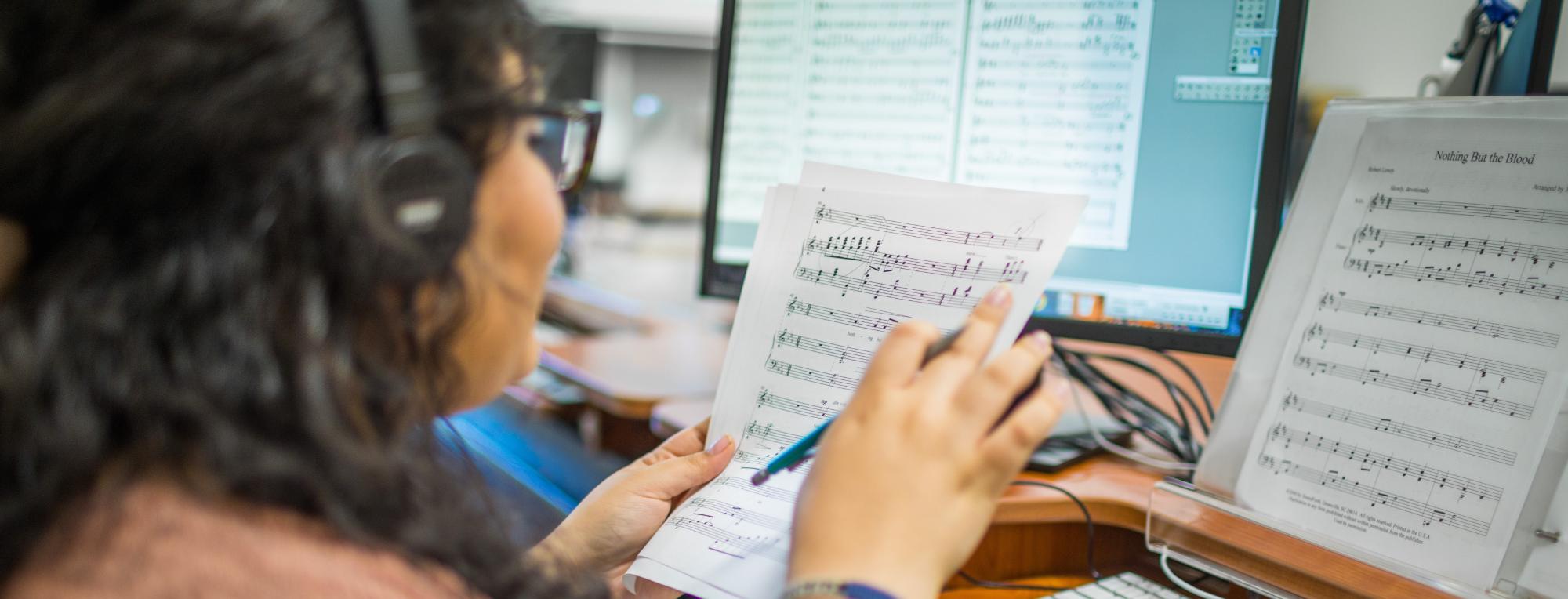Bachelor Degrees
The Bachelor of Music degree provides preparation for graduate study and career opportunities in writing, arranging, publishing and studio production, studio teaching, or performance, depending on the chosen major.
BMus, Guitar Performance (New Fall 2023)
BMus, Keyboard Performance (piano or organ)
BMus, Orchestral Instrument Performance
The Bachelor of Music Education degree (Choral or Instrumental tracks) prepares artist-teachers for career and ministry opportunities in private schools, public schools, and other communities of learning. The BME leads to South Carolina Department of Education licensure to teach K-12 music in elementary and secondary schools.
The Bachelor of Arts in Music and Bachelor of Science in Music degrees feature a strong foundational music curriculum combined with the flexibility to pursue interests in fields such as business, health science, communications, cross cultural studies, and others.
The Bachelor of Science in Music and Church Ministries focuses on the development of essential musicianship skills and their implementation in various ministries of the local church. A highly flexible church ministry emphasis allows both men and women to pursue their interest in Bible, pastoral ministry, worship, women’s ministries, youth ministry, Christian counseling or cross-cultural studies.
Certificate Programs
Church Music Ministry
This 13-credit certificate is designed for students in the BMus, BA/BS Music, and BME programs who have a desire to lead musical ministries in a local church. A Church Music Certificate student will acquire knowledge and develop skills in the leadership of various musical ministries in a local church and the history of congregational song in Christian worship. The student will also develop a theology of Christian worship and develop techniques for planning and leading gathered worship in the church. The certificate program culminates with a one-semester internship to be served in a local church under the supervision of a church leader. In this internship the student will demonstrate a variety of musical and leadership skills in the ministry of a local church. Students who wish to pursue this certificate should work with their first year/academic advisor and Dr. Fred Coleman, Head of the Department of Church Music.
Digital Audio Production
Upon completing this 10-credit certificate, a student will display competency in the fundamentals of digital audio production. They will have developed competency in operating audio equipment, MIDI sequencing, and the use of standard software such as Audacity, Logic, and Pro Tools. They will have tackled real world audio production situations through a variety of hands-on projects. The student will have received the necessary education to achieve Pro Tools certification. Students who wish to pursue this certificate should work with their first year/academic advisor and Dr. Paul Overly.
Keyboard Pedagogy
Qualifying music majors with an interest in piano or organ pedagogy will acquire knowledge of curricula and demonstrate the application of current trends in a variety of pedagogy classes, Theories of Teaching and Learning (Ed 201), and a one-semester pedagogy internship in which the student works one-on-one under faculty guidance with an elementary- or intermediate-level keyboard player. Students who wish to pursue this 12-credit certificate should work with their first year/academic advisor and Dr. Deanna Moore, Head of the Department of Keyboard Studies.
Music Minor
The Music Minor features instruction in music theory, music literature and private lessons and offers a four–semester concentration on one instrument of the student’s choice.
Master's Degree
Master of Music Education Degree (online) is designed for music teachers and administrators desiring to take the next step in their professional development. The all-online degree features flexible scheduling, classroom-based action research, peer-to-peer interaction, and instruction and guidance from our experienced music education faculty.
Course Highlights
Students in the Division of Music at BJU receive a thorough grounding in music history and theory, expert private instruction, and exciting ensemble experiences in a nurturing community of Christians focused on honoring Christ through music.
Applied Lessons (violin, viola, cello, double bass, flute, oboe, clarinet, bassoon, horn, trumpet, trombone, tuba, percussion, harp, piano, organ, guitar, and voice) – Individual study with artist-teachers in a studio setting.
Introduction to Music Literature – This foundational course traces the development of music from biblical times to the present, including both the western classical canon and world musics.
Music History: Antiquity to Baroque and Music History: Classical to Contemporary – These courses provide focused listening and study in each of seven major periods of music development: Antiquity, Renaissance, Baroque, Classical, Romantic, Modern/Post-tonal, and Contemporary.
Music Theory I, II, III, IV and Practical Musicianship I & II – These courses develop skills essential for listening to, performing, and creating music with understanding and artistry.
Elements of Conducting, Choral Conducting, and Instrumental Conducting – These courses introduce and develop hand independence and baton technique, score analysis skills, and rehearsal technique through extensive in-class conducting and work with lab ensembles.
Introduction to Music Technology, Notation in Music Technology, and Studio Production Techniques – These courses provide hands-on learning opportunities with a wide array of software and hardware, emphasizing practical application in music instruction, publishing, and production contexts.
The Entrepreneurial Musician Seminar – This seminar focuses on developing mindset and skills for music-related entrepreneurial ventures and applies principles of creativity and innovation, opportunity recognition, market research, branding, and promotion to the development and presentation of an actionable business plan. This is paired with a practicum with an area arts organization or music business to provide experiential learning that connects coursework to current workforce, economy, and ministry models.
Music and the Creative Image Bearer – Readings in philosophy, ethnomusicology, and musicianship to cultivate the expansion of musical values through the lens of a biblically informed understanding of creativity and aesthetics.
Artistry in Action-EXP – This course explores connections between music and a variety of other disciplines through project-based experiential learning and an interdisciplinary team-based approach to producing a portfolio of career-relevant deliverables such as research presentations, performances, and products across multiple media platforms. This course is designated as an experiential learning course (EXP).
.
